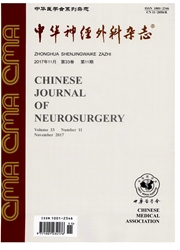

 中文摘要:
中文摘要:
目的研究辛伐他汀(Sire)抑制海人酸(KA)诱导的大鼠抽搐发作向颞叶癫痫(TLE)发展的长期影响。方法将大鼠分为健康对照组、盐水治疗癫痫组、Sim治疗癫痫组。KA诱导癫痫半小时后,Sire灌胃。(1)大鼠抽搐后3d评估了细胞因子(TNF-α、IL-1β、IL-6)的水平变化。(2)在4—6个月观察海马胶质细胞增生、神经元死亡、苔状纤维发芽(MFS)和大鼠癫痫发作情况。结果Sim降低了TNF-α、IL-1β水平,减轻了胶质细胞增生和神经元死亡,并抑制了海马MFS和癫痫发作。结论Sire具有抑制KA诱导的大鼠急性抽搐发作向TLE发展的效能。
 英文摘要:
英文摘要:
Objective To examined the effect of the chronic administration of Sire immediately after epileptic seizure in rat brains with temporal lobe epilepsy (TLE). Methods ( 1 ) We evaluated cytokine expressions 3 days post KA - lesions in the hippocampus. (2) We quantified reactive astroeytosis and neuron loss in the hippocampus at 4 - 6 months after KA - lesions. We then assessed aberrant mossy fiber sproutings (MFS) in the epileptic brain. Seizure scores were recorded 4 to 6 months after KA - lesions. Results We found that Sim - treatment suppressed lesion - induced expressions of tumor necrosis factor - α( TNF - α) and interleukin (IL) - 1β, suppressed reactive astrocytosis, and attenuated loss of neurons in the hippocampus. In contrast to the robust MFS observed in the saline - treated animals, Sim restrained the extent of MFS in epileptic rats. There was also a trend toward improvement in seizure scores. Conclusion Our study suggests that Sim administration might be a possible intervention and promising strategy for the prevention of SE intensifying to become chronic epilepsy.
 同期刊论文项目
同期刊论文项目
 同项目期刊论文
同项目期刊论文
 期刊信息
期刊信息
